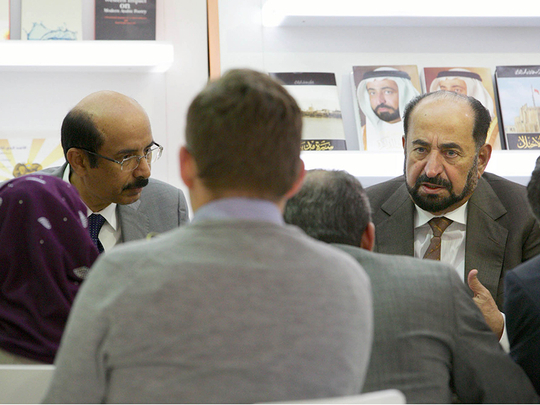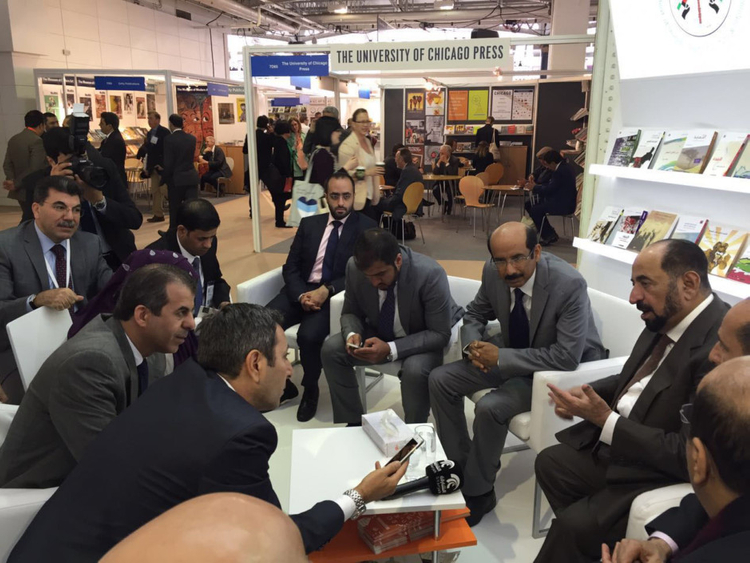
London: When he wrote his famous theatrical work, The Return of Holagu, His Highness Dr Shaikh Sultan Bin Mohammad Al Qasimi, Supreme Council Member and Ruler of Sharjah, was actually warning the Arabs of the threat of a modern Holagu, the Mongol ruthless warrior who invaded much of today’s Arab world.
“I wrote the play in 1997. It was sort of a prediction that [a modern] Holagu will return. If one looks at the events in Iraq in 2003, they realise how the vision [in the play] was very clear,” Dr Shaikh Sultan told UAE editors in a sit-down with the media on the sidelines of the London Book Fair, which concluded on Thursday.
“I wrote a similar concept in my play, The Black Stone. I wrote it four years ago. It contains events similar to the current turmoil in the Arab world, especially the [sectarian] division and destruction,” he added. “I always wish that the Arabs would know and understand what is meant [in those works].”
Dr Shaikh Sultan, a renowned historian and author, is a regular at the London Book Fair. He has just launched the English version of his book, Under the Flag of Occupation. In his speech at the launch, he called for a revision of British colonial history. He said the East India Company must be held responsible for a major part of the atrocities which were committed in the name of the empire.
When asked about this, he told the UAE editors that the objective historian is often reluctant to write during the actual event so that historians will not be influenced or biased. “History favours the victorious. And many historical records are distorted because they were written under the influence of those who were in power at the time. For the writer to be free of such influences or intimidation, he or she must write when the event is over,” he explained.
As for the possibility of revisiting Arab history, Dr Shaikh Sultan lamented the difficulty of writing Arab history. “If you follow my writings, you will find that I try to avoid that. I am very cautious,” he stressed, because he doesn’t want to instigate controversies or open old wounds.
In the West, he explained, “they have the ability to accept criticism and respect the other point of view”.
Part of Dr Shaikh Sultan’s history writing is his biography which started with his childhood and ended with him becoming the ruler of Sharjah in 1972. He said many others in the UAE have vast experiences that go back to the 1930s and 1940s but are reluctant to record them. “I wish that there is some sort of an entity that would open the door to such people to record those experiences for the benefit of our children and grandchildren,” he urged.
Dr Shaikh Sultan revealed that he is working on a massive historical work, which could be as big as seven volumes, to record and put in perspective the history of the Gulf region from “its beginnings until the current events. Nobody has ever attempted that. Some of the works lack depth or the actual sources to draw from. I have historical documents that will help in this task”, he said.
When asked about his ability to find the time for his love for writing in his busy schedule, Dr Shaikh Sultan said it was all about time management, and his greatest help in managing his time is the daily prayer. “The prayers are the absolute regulator of time,” he observed.
“I go to bed very early and wake up around 3.30am. I wait for the morning papers and when I am done reading them I read the Quran and perform Al Fajr. By 5am, my mind is clear and I am ready for work, starting with handling the letters and requests of people that come to my desk. I try not to waste my time on things that are not useful. I don’t watch much television but I follow some programmes on the radio, for example [the Sharjah Radio’s] Direct Line which allows me to listen to the people’s problems and requests.”
And he keeps a close eye on the performance of the local government bodies. “I always urge the officials to be very careful in attending to the people’s needs. They should not ignore even the small things and must not hesitate to take a decision in the interests of the people. I told them if they are not able to take a difficult decision, they can send it to me and I will help. But they should not ignore those needs because they cannot take a decision. The needs of the people are of absolute priority.”
‘I enjoyed working as a journalist’
In the one-hour long conversation with the editors, Dr Shaikh Sultan revealed that he himself was a journalist at one period of his life. “In my youth in school, I used to write two wall newspapers, one in Arabic and another in English,” he recalled. And in 1956, he worked as a correspondent for the Egyptian weekly Aakher Sa’ah.
“I used to send them news and reports about what was happening in the Emirates via Kuwait so I would not alert the colonial authority. The reports were published without my name. I was active and I wanted to expose the practices of the colonial authority in my country. I enjoyed the experience.”
In 1963, Dr Shaikh Sultan launched Al Yaqadha (Arabic for the Awakening) magazine. “I wrote and edited the entire magazine by myself. It was printed by Khalifa Al Nabooda in Dubai. However it lasted for only three months.”
“Journalism is like a garden full of roses but also has its share of thorns. Therefore, I urge the UAE press to be responsible and ensure credibility in its reporting and avoid unsubstantiated reports that only aim to sensationalise the news,” he said.









